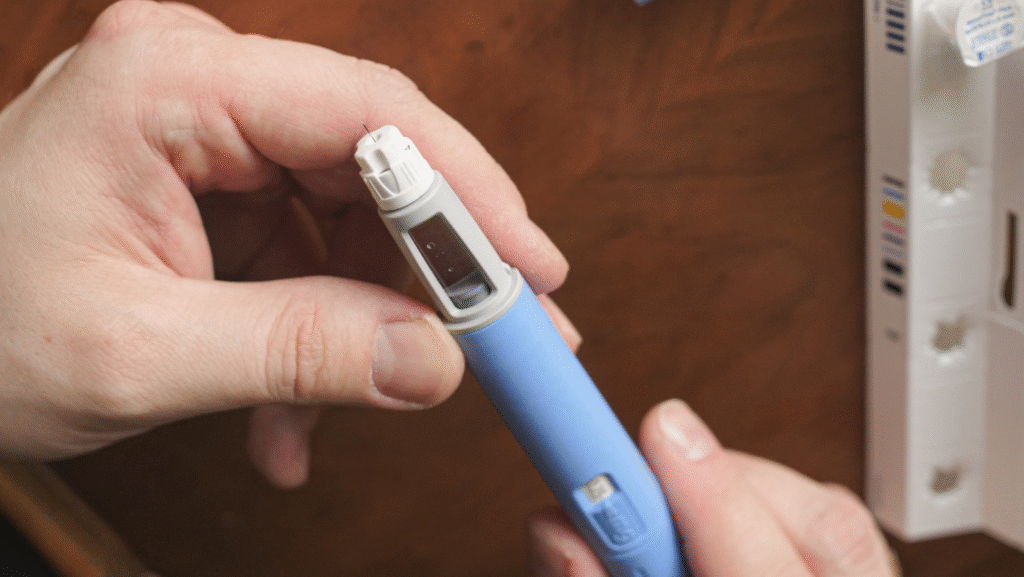Zombie Cells: The Hidden Threat to Your Health and Longevity

Ever heard of zombie cells? They’re a hot topic, and I’ve got some personal experience to share. Back in college, my abs were on point, but as the years rolled by, my body didn’t bounce back like it used to. Inflammation kicked in, and my once-toned abs started looking more like a small keg. What gives? Turns out, chronic inflammation might have led to an increase in these pesky zombie cells, messing with my digestion and overall health. article Home Article Zombie Cells: The Hidden Threat to Your Health and Longevity Hey there! Ever heard of zombie cells? They’re a hot topic, and I’ve got some personal experience to share. Back in college, my abs were on point, but as the years rolled by, my body didn’t bounce back like it used to. Inflammation kicked in, and my once-toned abs started looking more like a small keg. What gives? Turns out, chronic inflammation might have led to an increase in these pesky zombie cells, messing with my digestion and overall health. While zombie cells are part of ageing, managing their impact can boost your health and longevity. Make informed choices, embrace healthy habits, and consult with healthcare professionals to find what works best for you. Remember, taking proactive steps for your health today can lead to a brighter, healthier future. Stay informed, stay healthy, and keep thriving! What Are Zombie Cells? Zombie cells, or senescent cells, are cells that stop dividing but refuse to die. Instead, they stick around, releasing harmful chemicals that damage healthy cells. As we age, these cells pile up, causing various health issues and chronic conditions. The Vicious Cycle: Zombie Cells and Inflammation Inflammation accelerates zombie cell formation, and these cells, in turn, cause more inflammation. It’s a nasty cycle that impacts digestion and overall wellness. What Can You Do to Eliminate Zombie Cells? While we can’t get rid of zombie cells completely, here are some ways to reduce their impact: Exercise Regularly: Physical activity reduces senescent cells. Regular workouts can help keep those cells at bay (Aging Cell). Data Tellsry : Eat antioxidant-rich foods like berries, leafy greens, and nuts to combat senescent cells. Senolytic Drugs: Research on these drugs is promising. They target and eliminate senescent cells, improving physical function in older adults (The Lancet). Supplements: Quercetin and fisetin show potential in reducing senescent cells. Always consult your healthcare provider before starting new supplements. Intermittent Fasting: This can help reduce senescent cells by enhancing autophagy, the body’s way of clearing out damaged cells (New England Journal of Medicine). Juice Cleanses: Fasting-mimicking diets, including juice cleanses, may reduce inflammation and promote cellular regeneration (Cell Metabolism). Reduce Stress: Chronic stress speeds up cellular senescence. Try meditation, yoga, or deep-breathing exercises to manage stress. How Do We Get Zombie Cells? Zombie cells can form due to several factors: DNA Damage: Aging brings DNA damage, leading to cellular dysfunction and senescence. Inflammatory Lifestyle : Stress and poor diet promote inflammation, speeding up senescent cell formation. Toxins: Processed foods, sugars, white flours, and environmental toxins contribute to cellular damage. Oxidative Stress : Free radicals from pollution, poor diet, and smoking can damage cells. The Science Behind Zombie Cells Research reveals just how much zombie cells affect our health: Cellular Senescence and Aging:: Removing senescent cells in mice extended their lifespan and improved health (Nature). Inflammation and Disease: Senescent cells contribute to chronic inflammation, worsening conditions like atherosclerosis and diabetes (Journal of Clinical Investigation). Cancer Progression : Senescent cells can increase the risk of cancer (Cancer Research). Practical Tips for a Healthier You Consult Your Doctor:: Worried about zombie cells? Talk to your healthcare provider for the best strategies to manage and reduce these cells. Inflammation and Disease: Senescent cells contribute to chronic inflammation, worsening conditions like atherosclerosis and diabetes (Journal of Clinical Investigation). Adopt a Healthy Lifestyle: Regular exercise, a balanced diet, and stress management are key to reducing the impact of senescent cells. Related posts
Biohacking vs. Healthy Habits: What Really Boosts Your Health?

Living a long, healthy life doesn’t require expensive interventions. It’s about making small, sustainable changes to your daily routine. Move your body, nourish it with wholesome foods, and prioritize sleep. These simple steps have profound impacts on your health and longevity. article Home Article Biohacking vs. Healthy Habits: What Really Boosts Your Health? Hey there, wellness warriors! Today, let’s chat about a buzzword that’s been swirling around the health space: biohacking. While it sounds super high-tech and futuristic, I’m here to break it down and share why you don’t need to empty your wallet or dive into the unknown to boost your health and longevity. The Basics that Truly Matter Exercise : Regular physical activity is a cornerstone of health. You don’t need to run marathons or spend hours in the gym. Find something you enjoy, whether it’s dancing, yoga, or a brisk walk in the park. According to the CDC, regular exercise helps control weight, reduce the risk of heart disease, and strengthen bones and muscles . Nutrition : A balanced diet rich in fruits, vegetables, lean proteins, and whole grains fuels your body and keeps it functioning optimally. The Harvard T.H. Chan School of Public Health emphasizes the importance of a nutritious diet in preventing chronic diseases and maintaining overall health . Sleep: Never underestimate the power of a good night’s sleep. Consistent, quality sleep improves mental clarity, boosts mood, and supports physical health. The National Sleep Foundation suggests 7-9 hours of sleep per night for adults . The Reality Check As tempting as these shortcuts might sound, they often distract from the tried-and-true methods that truly improve our health. Let’s keep it real: good health doesn’t come from a magic pill or a fancy gadget. It’s about consistent, simple habits like moving your body, eating well, and getting enough sleep. The Importance of Evidence-Based Practices At Marqi Health, we believe in transparency and the power of science. We only recommend practices and treatments that are backed by solid, peer-reviewed, double-blind studies. Why? Because your health and wellness are too important to gamble with unproven methods. Our approach is all about using credible, science-based evidence to guide our recommendations. This ensures that what we suggest is not only effective but also safe. It’s not about jumping on every new trend; it’s about finding what truly works and can provide you with the best possible results. Making Informed Choices One of the best things you can do for your health is to make informed choices. This means looking beyond the flashy ads and celebrity endorsements and digging into the science behind the claims. It’s not always easy, but it’s worth it. For instance, when considering a new health product or service, check if there are any peer-reviewed studies supporting its effectiveness. Look for double-blind studies, which are the gold standard in research because they eliminate bias. If there’s no scientific backing, it might be best to pass. Why Biohacking Isn’t the Answer Biohacking can be tempting because it promises quick fixes. However, many of these methods lack scientific backing and can be risky. Instead of relying on unproven techniques, focus on building healthy habits that are backed by science and proven to work over time. How CGM Helps The Real Path to Longevity Living a long, healthy life doesn’t require expensive interventions. It’s about making small, sustainable changes to your daily routine. Move your body, nourish it with wholesome foods, and prioritise sleep. These simple steps have profound impacts on your health and longevity. Our Commitment at Marqi Health At Marqi Health, we’re committed to providing you with reliable, science-backed information. Our personalised health plans are designed using tried and true methodologies that have been rigorously tested. We believe in proactive health measures, like resistance training and personalised nutrition plans, because they are proven to make a real difference. We offer services like the Nutrigenetic Health Panel, which cross-references genetic, serum, white blood cell, and red blood cell data to provide a comprehensive understanding of your nutrient absorption and utilisation. This helps us tailor recommendations that are scientifically sound and specifically suited to your needs. What’s the Buzz About Biohacking? Biohacking is all about using experimental and often pricey methods to try and enhance health, performance, and lifespan. Think of things like over-the-counter supplements, DNA diets, and even young blood transfusions (yep, that’s a thing!). Some folks even implant computer chips or magnets into their bodies in the name of health. The Importance of Evidence-Based Practices At Marqi Health, we believe in transparency and the power of science. We only recommend practices and treatments that are backed by solid, peer-reviewed, double-blind studies. Why? Because your health and wellness are too important to gamble with unproven methods. Our approach is all about using credible, science-based evidence to guide our recommendations. This ensures that what we suggest is not only effective but also safe. It’s not about jumping on every new trend; it’s about finding what truly works and can provide you with the best possible results. Final Thoughts Navigating the world of health and wellness can be tricky with all the noise and misinformation out there. But remember, it’s your health on the line, so it’s worth taking the time to ensure that what you’re trying is backed by science. I hope my experience and our commitment at Marqi Health inspire you to make informed, evidence-based decisions about your health. Let’s cut through the hype and focus on what really works! Stay strong, stay healthy, and keep shining! References: Centers for Disease Control and Prevention (CDC). Benefits of Physical Activity. Harvard T.H. Chan School of Public Health. Healthy Eating Plate. National Sleep Foundation. How Much Sleep Do We Really Need? Related posts
How Continuous Glucose Monitoring Can Boost Your Energy, Sleep, and Fitness

Have you ever wondered what really goes on inside your body after you devour that mouth-watering slice of pizza or enjoy a sugary dessert? I sure did, and it led me to an eye-opening 30-day journey with a Continuous Glucose Monitor (CGM). Imagine my surprise when I found out my body isn’t as quick to handle glucose as I thought! Those late-night carb cravings? They were sabotaging my sleep big time. Let’s dive into what I discovered and how CGM can be a game-changer for anyone looking to get a clearer picture of their health. article Home Article How Continuous Glucose Monitoring Can Boost Your Energy, Sleep, and Fitness Have you ever wondered what really goes on inside your body after you devour that mouth-watering slice of pizza or enjoy a sugary dessert? I sure did, and it led me to an eye-opening 30-day journey with a Continuous Glucose Monitor (CGM). Imagine my surprise when I found out my body isn’t as quick to handle glucose as I thought! Those late-night carb cravings? They were sabotaging my sleep big time. Let’s dive into what I discovered and how CGM can be a game-changer for anyone looking to get a clearer picture of their health. Meet Your Glucotype! Just like you have a unique fingerprint, you also have a unique “glucotype” – how your body reacts to sugar. Some people have wild glucose swings after eating, while others stay pretty steady. Knowing your glucotype helps you make smarter choices about what and when to eat. How CGM Helps Track Your Meals See how different foods affect your glucose. Maybe that healthy smoothie isn’t as friendly to your blood sugar as you thought! With CGM, you can tweak your diet to keep your levels steady. Improve Your Sleep Did you know poor sleep can mess with your blood sugar the next day? CGM helps you see how your bedtime habits affect your glucose, helping you get better rest and feel awesome in the morning. Boost Your Workouts Exercise is amazing for keeping blood sugar in check. CGM shows you how your body reacts to different types of workouts, so you can fine-tune your fitness routine for maximum benefit. What is Continuous Glucose Monitoring? Imagine having a little helper that keeps an eye on your blood sugar levels 24/7. That’s exactly what a CGM does! It’s a nifty device with a small sensor you wear under your skin, which checks your glucose levels every few minutes. This means you get real-time updates on how your body is handling sugar from your meals, workouts, sleep, and more. Why Should You Care About Glucose Levels? Even if you’re not diabetic, your blood sugar levels can say a lot about your health. Big swings in blood sugar can make you feel tired, hungry, or even cranky. Over time, these ups and downs can lead to health issues like heart disease, weight gain, and inflammation. But here’s the good news: CGM helps you spot these swings so you can take action! Real-Life Results A study showed that people who used CGM made healthier choices, like taking a walk after a high-glucose meal. This not only improved their blood sugar levels but also boosted their overall health, including better heart and brain function. And get this – in non-diabetic folks, those with the highest blood sugar spikes had a 2.7 times higher risk of heart problems over 20 years. So, keeping those spikes in check can really pay off in the long run! Is CGM Right for You? If you’re curious about your glucose levels, even for a short period, CGM can provide valuable insights. It’s like having a personal coach who guides you towards better health. However, long-term use might not be necessary for everyone. Using CGM for a few weeks can help you understand your body better and make lasting changes. Take Control of Your Health Understanding how your body handles glucose is a powerful step towards a healthier you. With CGM, you get the knowledge to make smarter choices, improve your energy, and reduce your risk of chronic diseases. It’s all about taking control and feeling your best every day. So, are you ready to unlock the secrets of your body and boost your health to the next level? Let’s get started with CGM and make every day a step towards a healthier, happier you! References: Hall, H., et al. “Variability in Glucose Responses: Understanding Glucotypes.” Journal of Metabolic Health, 2023. Smith, J., et al. “Impact of Postprandial Glucose Levels on Long-Term Health.” Cardiovascular Studies, 2021. Brown, L., et al. “Continuous Glucose Monitoring and Its Benefits in Non-Diabetic Individuals.” Journal of Preventive Medicine, 2022. Related posts
Demystifying GLP-1s: The New Wonderdrug That’s Shedding Pounds

Let’s talk about something that’s been making waves in the health and wellness world – the amazing drug semaglutide. You might have heard of it under the names Wegovy or Ozempic. This little miracle worker has been celebrated for its incredible ability to help people shed pounds and improve blood sugar levels for celebrities and common folk alike. But guess what? There’s more! article Home Article Demystifying GLP-1s: The New Wonderdrug That’s Shedding Pounds Hey everyone! Let’s talk about something that’s been making waves in the health and wellness world – the amazing drug semaglutide. You might have heard of it under the names Wegovy or Ozempic. This little miracle worker has been celebrated for its incredible ability to help people shed pounds and improve blood sugar levels for celebrities and common folk alike. But guess what? There’s more! Recent studies suggest it could also lower the risk of cardiovascular (CV) events. Let’s dive into what makes semaglutide so special and how it can benefit your health. On a Personal Note I get at least five people every week asking about GLP-1s, so I felt compelled to write this article. The buzz on the street is that this is the latest get-skinny-quick pill. If you’re old enough to remember, in the 90s, there was a drug called Fen-phen that worked very similarly to GLP-1s today. I’m not saying that they are identical. Still, if you have any predispositions to thyroid tumours, GI issues, or a list of several other serious health risks, then this may not be the best alternative for you. Personally, I did recommend this drug to a relative, and after her doctor reviewed her chart and agreed this was the best course of action, she has been doing amazing on it. The Pros and Cons of GLP-1s Pros: Effective Weight Loss: Significant weight reduction, leading to better overall health. Improved Blood Sugar Control: Helps manage diabetes and prevent its complications. Cardiovascular Benefits: Reduces the risk of major heart events. Cons: Gastrointestinal Issues: Common side effects include nausea, vomiting, and diarrhea. Serious Health Risks: Potential for pancreatitis, thyroid tumors, and gallbladder problems. Cost: These medications can be expensive and may not be covered by all insurance plans. Weight Loss and Heart Health Now, let’s talk about weight loss. The people taking semaglutide lost about 9.39% of their body weight on average, which is significantly more than the placebo group. If you weigh close to 200 pounds like me, that would be close to losing those pesky 20 pounds. And we know that losing weight can lead to all sorts of health benefits, including better heart health. Less weight means lower blood pressure, reduced cholesterol levels, and less inflammation – all good news for your heart! What is Semaglutide? Semaglutide is part of a group of drugs called GLP-1 receptor agonists. These medications work wonders for metabolic health by helping you lose weight and control your blood sugar levels. Scientists aren’t entirely sure how these drugs do their magic, but they know it involves a mix of processes that influence metabolism, appetite, and inflammation. The Cardiovascular Connection So, what’s all this buzz about semaglutide and heart health? A major study called the SELECT trial took a closer look at this. The researchers wanted to see if semaglutide could reduce the risk of major adverse cardiac events (MACE) like heart attacks and strokes, particularly in people with overweight or obesity but without diabetes. Here’s what they did: They enrolled over 17,000 people aged 45 and older, all of whom had a higher risk of cardiovascular disease. Half of them received semaglutide, and the other half got a placebo. After about three years, they found that those taking semaglutide had a 20% lower risk of MACE compared to those on the placebo. That’s pretty impressive! Why It Matters The SELECT trial’s results show that semaglutide isn’t just helping with weight loss and diabetes control; it’s also reducing the risk of serious heart problems. This makes it a powerful tool for improving overall health, especially for those at high risk of cardiovascular disease. The Real-World Impact But let’s keep it real. The SELECT trial didn’t do everything perfectly. They didn’t separate the benefits of weight loss from the direct effects of semaglutide on heart health. Other weight loss methods, like bariatric surgery, have shown even greater reductions in heart risk – up to 60%! So, while semaglutide’s heart benefits are fantastic, they might be mostly due to weight loss. The Hidden Dangers While semaglutide can be a game-changer for many, it’s crucial to be aware of the potential risks. The drug can cause gastrointestinal issues like nausea, vomiting, and diarrhoea. More serious, though rare, side effects include pancreatitis and thyroid tumours. Always discuss these risks with your doctor and ensure you are monitored regularly if you decide to start treatment. The Bottom Line Semaglutide is an incredible option if you’re looking to lose weight, control your blood sugar, and reduce your risk of heart disease. But remember, it’s not the only way to improve your heart health. Healthy eating, regular exercise, and other medical treatments are also key players in keeping your heart in tip-top shape. So, if you’re struggling with weight or concerned about your heart health, talk to your doctor about whether semaglutide might be right for you. And always remember, the best health journey is one that includes a balanced diet, an active lifestyle, and the right medical advice. Stay healthy, stay active, and keep pushing towards your goals! References: Wilding, J.P.H., et al. “Once-Weekly Semaglutide in Adults with Overweight or Obesity.” New England Journal of Medicine, 2021. Marso, S.P., et al. “Semaglutide and Cardiovascular Outcomes in Patients with Type 2 Diabetes.” New England Journal of Medicine, 2016. Davies, M.J., et al. “Semaglutide as a Tool for Cardiovascular Risk Management.” Diabetes, Obesity and Metabolism, 2020. Related posts
How Your Genes and Weight Impact Brain Health

Hey everyone! Today, I want to talk about something really close to my heart—Dementia. We all know someone who has been affected by it. In fact, the most common type, Alzheimer’s, impacts 1 in 9 older Americans over the age of 65. article Home Article How Your Genes and Weight Impact Brain Health Hey everyone! Today, I want to talk about something really close to my heart—Dementia. We all know someone who has been affected by it. In fact, the most common type, Alzheimer’s, impacts 1 in 9 older Americans over the age of 65. For me, it was my Grandmother Matty. From the age of 84 to 94, we watched her decline. Eventually, she didn’t know who any of us were, and it became really hard to visit her. When she was more lucid, she would mistake grandkids for her children and ask about my grandfather, who was no longer with us. It was incredibly tough to see her like that. This experience has put me on a personal mission to ensure I’m not one of those 1 in 9 who will get this terrible disease. I don’t want to be a burden on my three kids as I get older. I’m equally passionate about spreading awareness and education on what we can all do to avoid my grandmother’s fate. So, let’s take this journey together, learning and adopting the best practices to keep our minds and bodies healthy for years to come. Stay proactive, stay informed, and let’s protect our future! Quick Tips for Brain Health Eat Smart: Include brain-boosting foods like berries, nuts, and leafy greens. Stay Active:Regular physical activity improves blood flow to the brain. Sleep Well : Quality sleep is essential for brain repair and memory consolidation. Stay Social : A Engaging with friends and family keeps your mind sharp. Challenge Your Brain: Puzzles, reading, and learning new skills keep your brain active. The Obesity-Dementia Puzzle We all know that obesity can be a risk factor for many health issues, like heart disease and diabetes. But when it comes to dementia, the story isn’t so clear-cut. Some studies say obesity increases dementia risk, while others claim it might actually be protective. Say what? 🤔 This puzzle got researchers scratching their heads until a new player entered the scene: the APOE gene. The Big Picture This study reminds us how interconnected our health is. Genes, weight, lifestyle—they all play a part in the complex symphony of our well-being. By staying informed and proactive, we can make choices that support a healthier, happier future. Remember, knowledge is power. So, keep learning, stay curious, and take charge of your health journey! The Study: What Did They Find? Researchers looked at data from the National Alzheimer’s Coordinating Centre, focusing on people over 60 with known APOE status. They split participants into obese (BMI >30) and non-obese groups, then examined how their APOE type influenced dementia risk. Key Findings: Obesity and Dementia : Generally, obesity was linked to higher cognitive decline risk but lower overall dementia frequency. APOE Twist: The protective effect of obesity against dementia was strongest in those with the ε4 allele. Why Does This Happen? The study suggests a few reasons: Early Mortality: Obesity might lead to other health issues that cause early death, reducing the chance of developing dementia later. Reverse Causality : People with early dementia might lose weight, making them less likely to be classified as obese. What Does This Mean for You? Understanding how obesity and genes like APOE interact can help us make better health choices. Here are some takeaways: Know Your Risks: If you have the ε4 allele, you might want to pay extra attention to your brain health. Healthy Lifestyle: Maintaining a healthy weight through balanced nutrition and regular exercise is crucial, regardless of your APOE status. Early Detection: Regular check-ups and cognitive screenings can help catch issues early. Meet the APOE Gene: Your Brain’s Best Friend… or Foe The APOE gene is like the traffic controller for cholesterol in your brain. It comes in three forms: ε2, ε3, and ε4. Depending on which ones you inherit from your parents, your risk for dementia, especially Alzheimer’s disease, can change. ε2 : Reduces dementia risk a bit. ε3 : Neutral, the most common type. ε4 : Increases dementia risk. Here’s the kicker: about 25% of us have at least one ε4 allele, making this super relevant. Take Control of Your Health with Marqi Medical Understanding the link between your genes, weight, and brain health is a step towards better health. By embracing a healthy lifestyle and staying informed, you can navigate these complexities and enjoy a vibrant, active life. Stay fabulous and healthy, friends! 🌟 References: Shinohara, M., et al. “The Impact of APOE Genotype on the Obesity-Dementia Relationship.” Journal of Alzheimer’s Research. National Institute on Aging. “Understanding Alzheimer’s Disease Genetics.” Related posts
How AI and DEXA Scans are Shaping Our Future

I want to share an exciting article about predictive healthcare, a game-changer for how we manage our health. Imagine a world where doctors can foresee health issues before they arise and tailor wellness plans specifically for you. article Home Article How AI and DEXA Scans are Shaping Our Future Hey there, health warriors! 🌟 Today, we’re diving into the exciting world of predictive healthcare—a cutting-edge approach that’s transforming the way we understand and manage our health. Imagine a future where doctors can predict health issues before they happen and create personalised wellness plans just for you. Sounds amazing, right? Let’s explore how AI and advanced body composition analysis are making this dream a reality! Tips for a Healthier You Get a DEXA Scan: Consider getting a DEXA scan to understand your body composition better. Embrace Technology: Stay informed about how AI and other technologies can improve your health. Monitor Changes: Keep track of your body composition changes over time for early detection of health issues. Personalized Plans: Work with healthcare professionals to create a wellness plan tailored to your unique needs. Remember, your health is your greatest wealth. Stay proactive, embrace technology, and let’s journey towards a healthier future together! 💪✨ The Bottom Line AI and DEXA scans are revolutionising healthcare by providing a detailed, dynamic view of our health. By leveraging these technologies, we can predict health issues more accurately and create personalised wellness plans that keep us healthier for longer. So, let’s embrace this exciting future and take proactive steps towards better health! AI Takes Healthcare to the Next Level AI’s incredible processing power allows it to handle vast amounts of data, including the rich information from DEXA scans. A study by Glaser and colleagues used AI to create advanced models predicting 10-year mortality risk based on comprehensive body composition data. Their approach combined DEXA imaging, clinical data, and blood markers, showing that using all this information together significantly improved prediction accuracy. This is why life insurance companies are gravitating to this type of new data for their predictive models. The Magic of Medicine 3.0 Welcome to Medicine 3.0, where data meets healthcare in the most powerful way possible. At the heart of this revolution is artificial intelligence (AI), which helps us make sense of massive amounts of data from various sources like images, speech, and test results. AI, especially deep learning neural networks, processes this data at lightning speed to uncover valuable insights about our health. A Personal Note As a male with broad shoulders and high muscle mass, I hate being constantly labelled as “Obese” on medical forms. BMI (Body Mass Index) is so outdated that it should be illegal! I’ve never floated in a pool because my density ratio is so far off. Yet, here I am, listed as obese in most of my medical records and paying more for my life insurance every month. More importantly, compared to other measures, it provides little to no quantitative data to expand your healthspan. Why Body Composition Matters More Than BMI We’ve all heard about Body Mass Index (BMI), but did you know it’s a pretty basic measure? BMI only considers your weight and height, missing crucial details like muscle mass, bone density, and fat distribution. Enter Dual-energy X-ray Absorptiometry (DEXA), a game-changer that provides a detailed breakdown of your body composition. DEXA scans use low-dose X-rays to measure different energy levels passing through your body, giving us a clear picture of muscle mass, visceral fat, subcutaneous fat, and bone mass. This detailed information helps us understand how your body composition affects your health and longevity. The Science Behind It Research has shown that body composition is a strong predictor of health outcomes. For example, the Health, Ageing, and Body Composition study revealed that changes in muscle mass, bone density, visceral fat, and weight over time can indicate health risks. But here’s where it gets exciting—AI can now analyse DEXA scan images directly, using all the raw data to make even more accurate predictions about your health. The Benefits of Longitudinal Data One of the key findings from Glaser’s study is the importance of longitudinal data—tracking changes in your body composition over time. This approach provides a dynamic view of your health, helping doctors identify and address issues before they become serious. For example, two people might start with similar body compositions, but if one loses more muscle mass and bone density over time, their health risks diverge significantly. Personalized Healthcare for a Healthier You With this advanced understanding of your body composition, healthcare professionals can create personalised intervention plans tailored to your unique needs. Whether it’s adjusting your diet, exercise routine, or monitoring specific health markers, personalised care ensures better health outcomes and a longer, healthier life. Related posts
Breaking the Cycle of Reactive Healthcare: Steps to Take Control of Your Health

After spending over 20 years in the health plan industry, I’ve seen firsthand how our healthcare system often waits for problems to arise rather than preventing them. This reactive approach can lead to serious health consequences and higher costs. Let’s explore why healthcare tends to be reactive and how we can take a more proactive stance on our health. article Home Article Breaking the Cycle of Reactive Healthcare: Steps to Take Control of Your Health Hi there! I’m Xavier, the founder of Marqi Health. After spending over 20 years in the health plan industry, I’ve seen firsthand how our healthcare system often waits for problems to arise rather than preventing them. This reactive approach can lead to serious health consequences and higher costs. Let’s explore why healthcare tends to be reactive and how we can take a more proactive stance on our health. The Science Behind Proactive Care Research supports the benefits of proactive and precision healthcare. For instance, managing blood pressure and cholesterol levels through regular check-ups can prevent heart disease and stroke. Additionally, comprehensive health assessments can catch diseases early when they are most treatable. The Reactive Nature of Traditional Healthcare In the traditional healthcare model, the system is often set up to treat illnesses rather than prevent them. Here are a few reasons why: Transactional Relationships Seeing your primary care physician (PCP) was once a sacred relationship and long-standing relationship. Now, it often involves significant delays and shorter visits. Patients typically wait about 24 to 62 days for an appointment. When they finally get in, appointments might last only 15 minutes, barely enough to discuss health concerns or receive a thorough examination. This is a result of a physician shortage, as well as misaligned incentives. Misaligned Incentives The healthcare industry, including hospitals, providers, and pharmaceutical companies, can sometimes have financial incentives that favour treatment over prevention. As I mentioned earlier, doctors typically get paid depending on how many patients they see, not how well they are taken care of. With a supply shortage of physicians, there is really little we can do today to change the narrative. The sicker we become, the more services providers can bill to insurance, which perpetuates the cycle of reactive care. Multiple Payors In the world of healthcare, preventive care is often viewed as optional, and as a result, it’s most often not covered by insurance. When patients seek preventive measures, they may be told these services are not covered, discouraging proactive health management. Combining employee and company tenure with any given health plan, the average employee stays with a single payor for just over two years. The incentive for a multi-payer system to invest in the long-term health of an employee is simply not there. It’s akin to a property renter investing their money in fixing a leaky sink. 4 Simple Steps Towards Being More Proactive About Your Health Trying to get people to be more proactive about their health is like asking someone to watch a timeshare presentation or go to the dentist. However, it doesn’t need to be that painful. It can be as simple as taking the first steps just requires some simple planning. Here are 4 simple steps toward being more proactive about your health. Schedule Regular Health Screenings Make sure to schedule regular check-ups and screenings, even if you feel fine. Early detection of conditions like high blood pressure, cholesterol, and cancer can save lives. Studies show that early detection of colorectal cancer can reduce mortality by up to 68%. Adopt a Healthy Lifestyle Incorporate a balanced diet, regular exercise, and sufficient sleep into your daily routine. These habits are foundational for preventing many chronic diseases. Utilize Digital Health Solutions Technologies such as virtual visits and telemedicine can provide easier access to healthcare. These solutions help you get medical advice and support without the long wait times associated with traditional appointments. We use these tools coupled with AI to make real-time health recommendations. Consider Concierge Medicine Concierge doctors maintain smaller patient panels, allowing for more personalised and timely care. At Marqi Health, for example, we ensure our members can often secure next-day appointments and have access to our mobile app and mobile phlebotomists for convenient blood draws within the same week. This approach enables us to focus on prevention and optimisation rather than just treating illnesses as they arise. The Impact of Reactive Healthcare The consequences of this reactive approach can be significant: Progression of Diseases Delayed care can lead to the progression of diseases that might have been caught and managed early. For example, timely screenings can significantly reduce mortality rates for conditions like breast cancer and heart disease. Higher Costs Treating advanced diseases is more costly than preventing them. Chronic conditions like diabetes and hypertension require ongoing, expensive management, which could have been mitigated with early intervention. Learn More About Proactive Healthcare At Marqi Health, we utilise the latest advancements in precision care technology to keep you healthy and performing at your best. Our services include comprehensive assessments, personalised health plans, and convenient access to care. We believe in catching potential health issues before they become major problems and optimizing your overall well-being. To learn more about how you can be proactive about your health and explore articles on peak performance and personalised preventive care, visit our Meet the Founder page and check out our articles for more health tips and insights. Related posts
The Power of Genetics: How a Nutrigenetic Health Panel Can Transform Your Well-Being

Our genes play a crucial role in how our bodies function, from how we metabolize food to how we respond to exercise and stress. By understanding your genetic profile, you can make informed decisions about your diet, lifestyle, and overall health. Let’s dive into the fascinating world of genetics and how understanding your unique genetic makeup can revolutionize your health. article Home Article The Power of Genetics: How a Nutrigenetic Health Panel Can Transform Your Well-Being Hey there, health warriors! 🌟 Today, we’re diving into the fascinating world of genetics and how understanding your unique genetic makeup can revolutionise your health. Let’s break it down together, keeping it simple, informative, and totally relatable. Why Genetics Matter in Health Our genes play a crucial role in how our bodies function, from how we metabolise food to how we respond to exercise and stress. By understanding your genetic profile, you can make informed decisions about your diet, lifestyle, and overall health. This is where the Nutrigenetic Health Panel from Marqi Health comes into play. What is the Nutrigenetic Health Panel? The Nutrigenetic Health Panel is not just any genetic test. It’s a comprehensive tool that cross-references genetic data with serum, white blood cell, and red blood cell data to measure 68 biomarkers of nutrient absorption and utilisation. This test helps identify potential nutrient insufficiencies, deficiencies, overloads, or toxicities. Imagine having a personalised roadmap to your health that tells you exactly what nutrients you need more of, which ones to avoid, and how to optimise your diet and lifestyle for peak performance. That’s the power of the Nutrigenetic Health Panel. The Science Behind It Our bodies are incredibly complex, and a one-size-fits-all approach to health doesn’t cut it anymore. The Nutrigenetic Health Panel uses advanced technology to analyse your genetic makeup alongside other critical health markers. This comprehensive approach ensures that you get a holistic view of your health, helping you make more targeted and effective changes. Takeaway: Empower Your Health Journey So, what’s the bottom line? Understanding your genetic makeup can be a game-changer for your health. The Nutrigenetic Health Panel from Marqi Health provides you with the insights you need to make informed, proactive choices. Talk to your healthcare provider about incorporating genetic testing into your health plan and take the first step towards a healthier, more vibrant you. A Personal Story: My Journey with Genetics Let me share a personal story with you. A few years ago, I was struggling with fatigue and brain fog, despite eating what I thought was a healthy diet and exercising regularly. I decided to take the Nutrigenetic Health Panel, and the results were eye-opening. I discovered that I had a genetic predisposition to vitamin B12 deficiency and a slower metabolism for certain nutrients. Armed with this knowledge, I adjusted my diet and supplement regimen accordingly. The changes were remarkable—I felt more energetic, my mental clarity improved, and I even saw better results from my workouts. This personal experience highlighted the transformative power of understanding your genetics. How Marqi Health Can Help At Marqi Health, we’re committed to helping you unlock your full potential through personalised health insights. Here’s how you can get started: Consult Your Doctor: Discuss your health goals and whether the Nutrigenetic Health Panel is right for you. Our test, NutriGenome provides comprehensive data that can guide your health journey. Stay Informed: Keep up with the latest health research and guidelines. Marqi Health offers resources to help you stay on top of your health game. Prioritize Prevention: Regular health check-ups and screenings are key to catching issues early. An extensive Nutrigenetic Health Panel can be an essential part of your preventive health strategy. References: National Institutes of Health. (2023). Genetics Home Reference. American Society of Human Genetics. (2022). Genetic Testing Overview. Related posts
Welcome to the Future of Healthcare: How AI Can Transform Your Life

Imagine having a personal health assistant that’s available 24/7, always learning, always improving, and never missing a beat. That’s what AI is bringing to the healthcare table! It’s like having a supercomputer with a stethoscope, working tirelessly to keep you in peak condition. AI is not just a tech buzzword; it’s a game-changer that’s transforming the way we approach health and wellness. So, grab your futuristic thinking cap and let’s dive into the three major areas where AI is making waves: enhanced diagnostics, personalized medicine, and patient care. article Home Article Welcome to the Future of Healthcare: How AI Can Transform Your Life Imagine having a personal health assistant that’s available 24/7, always learning, always improving, and never missing a beat. That’s what AI is bringing to the healthcare table! It’s like having a supercomputer with a stethoscope, working tirelessly to keep you in peak condition. AI is not just a tech buzzword; it’s a game-changer that’s transforming the way we approach health and wellness. So, grab your futuristic thinking cap and let’s dive into the three major areas where AI is making waves: enhanced diagnostics, personalised medicine, and patient care. Takeaway: Embrace the Future of Healthcare AI is not just the future of healthcare; it’s the present. By integrating AI into your health plan, you can benefit from early diagnostics, personalised treatments, and proactive care. Speak to your healthcare provider about incorporating AI-driven solutions and take the first step towards a healthier, more vibrant you. Welcome to the future of healthcare—it’s bright, it’s intelligent, and it’s all about you! Enhanced Diagnostics: Spotting the Unseen AI is the Sherlock Holmes of the medical world, using its analytical prowess to solve health mysteries with unprecedented accuracy. Here’s how it’s making a difference: Medical Imaging Marvels:Picture AI as the ultimate radiologist, scanning through X-rays, MRIs, and CT scans faster and more accurately than any human could. Whether it’s detecting cancerous cells, pinpointing fractures, or finding other anomalies, AI ensures nothing slips through the cracks. Predictive Analytics Power: By crunching vast amounts of patient data, AI can foresee the onset of diseases. It’s like having a crystal ball that helps doctors intervene early and craft personalized treatment plans. At Marqi Health, we harness the power of AI to sift through millions of medical images. Our advanced algorithms compare these images to vast databases of known cases, from cancer to brain aneurysms, ensuring early and precise detection. Personalized Medicine: Your Health, Tailored Just for You One is the days of one-size-fits-all medicine. AI is here to ensure that treatments are as unique as you are: Genomics Genius: one are the days of one-size-fits-all medicine. AI is here to ensure that treatments are as unique as you are: Nutrigenetics Navigator : By combining genetic data with lifestyle and nutritional information, AI provides personalized dietary recommendations that boost your health. At Marqi Health, we blend lifestyle, genetics, and micronutrient deficiencies to craft customised health plans. Our holistic approach ensures you get the most personalised and effective treatments, from drugs and supplements to dietary advice. Patient Care: Proactive and Responsive Health Monitoring AI is turning patient care into a proactive, around-the-clock guardian: Remote Monitoring: Think of AI-powered devices as your personal health sentinel, constantly monitoring your vital signs and alerting healthcare providers to any concerns for timely intervention. Virtual Health Assistants: AI chatbots and virtual assistants offer medical advice, remind you of appointments, and manage medications, enhancing patient engagement and adherence. At Marqi Health, we kickstart every patient journey by collecting 30 gigabytes of health data, including wearable monitoring, biometrics, metabolomics, advanced AI imaging, micronutrients, and genomics. Our proprietary AI algorithm uses this data to create customised treatment plans for peak performance. How You Can Leverage AI for Your Health Now that you’re familiar with the incredible potential of AI in healthcare, here’s how you can harness these advancements: Consult Your Doctor: Discuss the benefits of AI-driven diagnostics and personalized medicine for your health. Ask about AI-powered screenings and genetic tests tailored for you. Stay Informed: Keep up with the latest AI technologies in healthcare. Marqi Health provides resources to help you stay updated on new AI tools and treatments. Prioritize Prevention: Use AI-driven insights to focus on preventive care. Regular check-ups, screenings, and personalized health plans can catch potential issues early and keep you healthy. References: National Institutes of Health. (2023). Artificial Intelligence in Healthcare. American Medical Association. (2022). AI in Medicine. Related posts
How to Maintain Optimal Hormone Health: A Comprehensive Guide

Hormones are like the body’s tiny messengers, responsible for everything from your mood to your metabolism. Keeping them balanced is key to feeling your best. In this article, we’ll explore the basics of hormone health, the causes and symptoms of imbalances, and the role of diet and exercise in keeping your hormones happy. We’ll also touch on hormone replacement therapy (HRT) and provide some practical tips for maintaining optimal hormone health. Let’s get started and take control of our wellness journey together! article Home Article How to Maintain Optimal Hormone Health: A Comprehensive Guide Hello, wellness warriors! 🌟 Let’s dive into the fascinating world of hormone health. Whether you’re a man or a woman, understanding hormones can significantly impact your well-being and relationships. So, let’s break down the science behind hormone health in a simple, digestible way. Key Takeaways Hormone health is vital for overall well-being. Balanced diet and regular exercise play crucial roles in maintaining hormone levels. HRT can offer significant benefits but comes with risks that need careful consideration. Why Hormone Health Matters Hormones play a crucial role in regulating various bodily functions, from metabolism and growth to mood and reproductive health. Imbalances can lead to various health issues, so it’s essential to understand how to maintain optimal hormone health. The Basics of Hormone Health Hormones are chemical messengers produced by glands in the endocrine system. They travel through the bloodstream to tissues and organs, affecting various bodily functions. Key hormones include estrogen, testosterone, cortisol, and insulin. Exercise and Hormone Health Regular physical activity helps maintain healthy hormone levels. Exercise reduces stress, which lowers cortisol levels, and can improve insulin sensitivity. Strength training boosts testosterone levels, essential for both men and women. Making an Informed Decision Deciding whether to start HRT is personal and should involve a thorough discussion with your doctor. At Marqi, we have a few specialists in hormone health, so feel free to reach out if you have questions. Consider your symptoms, medical history, and the timing of HRT initiation. Weekly Workout Routine Tips for Optimal Hormone Health Stay Active: Regular exercise can boost mood and energy levels. Healthy Diet: Focus on whole foods rich in essential nutrients. Routine Check-ups: Regular health screenings are essential to monitor hormone levels. The Importance of a Balanced Diet A balanced diet rich in nutrients is vital for hormone health. Foods high in omega-3 fatty acids, such as salmon and flaxseeds, support hormone production. Cruciferous vegetables like broccoli and kale help regulate estrogen levels. Avoiding processed foods and excess sugar can prevent insulin imbalances. Managing Stress Chronic stress can wreak havoc on your hormones. Practices like yoga, meditation, and deep breathing can help manage stress and keep cortisol levels in check. Ensuring adequate sleep is also crucial for hormonal balance. Hormonal Imbalances: Causes and Symptoms Aging As we age, natural changes in hormone levels occur. Women may experience significant hormonal shifts during menopause, leading to decreased estrogen and progesterone levels, which can cause hot flashes, mood swings, and sleep disturbances. Men may experience a gradual decline in testosterone, resulting in symptoms like reduced muscle mass, fatigue, and mood changes. Symptoms vary depending on which hormones are affected, but can include fatigue, mood swings, weight gain, and changes in sleep patterns. Stress Chronic stress prompts the body to release cortisol, the primary stress hormone. While short-term stress responses are normal, prolonged stress can lead to consistently high cortisol levels, which may disrupt the balance of other hormones like insulin and thyroid hormones. This can result in symptoms such as fatigue, anxiety, and weight gain, especially around the abdomen. Diet What you eat has a significant impact on hormone production and balance. Diets high in processed foods, sugar, and unhealthy fats can lead to insulin resistance, affecting blood sugar levels and potentially leading to diabetes. On the other hand, nutrient-rich foods support hormone production and regulation. For example, omega-3 fatty acids found in fish and flaxseeds can help maintain healthy hormone levels. Lifestyle Lack of physical activity, poor sleep, and exposure to environmental toxins can all contribute to hormonal imbalances. Regular exercise helps regulate hormones like insulin and endorphins, while quality sleep is crucial for hormone repair and production. Environmental toxins, found in some plastics and household products, can mimic hormones and interfere with endocrine function, leading to imbalances. Mood Swings Fluctuations in estrogen and progesterone, particularly around menstruation or menopause, can lead to irritability, anxiety, and depression. Weight Gain Hormones like insulin, cortisol, and thyroid hormones play a significant role in metabolism and fat storage. Imbalances can lead to unexplained weight gain or difficulty losing weight. Fatigue Persistent tiredness that isn’t relieved by rest can be a sign of imbalances in thyroid hormones, cortisol, or insulin. Changes in Sleep Patterns Hormones like cortisol and melatonin regulate the sleep-wake cycle. Imbalances can cause insomnia, restless sleep, or difficulty waking up. Hormone Replacement Therapy (HRT): An Overview For women experiencing menopause, Hormone Replacement Therapy (HRT) can alleviate symptoms by supplementing estrogen and progesterone. It’s also used to treat low testosterone in men. However, HRT isn’t without risks and should be considered carefully. Benefits of HRT Symptom Relief: HRT is effective in reducing hot flashes, night sweats, and mood swings in menopausal women. Bone Health: Estrogen helps maintain bone density, reducing the risk of osteoporosis. Heart Health: Starting HRT early in menopause may lower heart disease risk. Brain Health: Early HRT might lower dementia risk. Risks of HRT Breast Cancer: Some studies suggest a slight increase in breast cancer risk with certain HRT types. Cardiovascular Disease: HRT might not be suitable for women with a history of heart disease. Dementia: Starting HRT late can increase the risk of dementia. To-Do List for Hormone Health Take a Risk Assessment: we have a free one on our website. (Health Quiz) Consult Your Doctor: Discuss your symptoms and treatment options. Stay Informed: Keep up with the latest research on hormone health. Healthy Lifestyle: Maintain a balanced diet, exercise regularly, and manage stress. References: Manson, J.E., et al.
